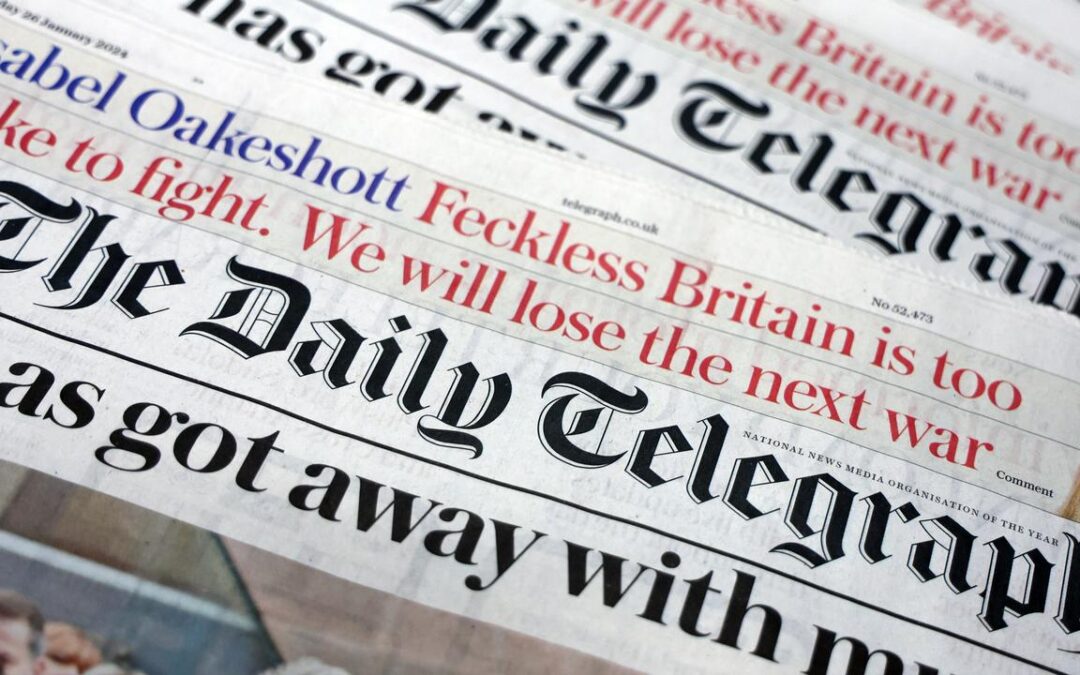
Daily Mail owner strikes $1b deal for UK’s Telegraph
Daily Mail owner DMGT says it has struck an Stg500 million ($A1 billion) deal to buy rival newspaper the Telegraph in a tie-up that would create one of the most powerful right-leaning media groups in Britain.
The deal comes a week after US-based private investment firm RedBird Capital Partners withdrew its bid for the Daily Telegraph, one of Britain’s biggest newspapers.
Daily Mail and General Trust (DMGT) agreed to purchase the Telegraph from RedBird IMI after an attempted purchase by the Abu Dhabi-backed RedBird Capital Partners investment firm was blocked by the then Conservative government.
People close to the talks said the transaction was worth about Stg500 million ($A1 billion).
The parties have entered a period of exclusivity to finalise the terms of the transaction and to prepare the necessary regulatory submissions, which they expect to happen quickly.
The Telegraph did not immediately respond to Reuters’ request for comment.
A spokesman for RedBird IMI said: “DMGT and RedBird IMI have worked swiftly to reach the agreement announced today, which will shortly be submitted to the Secretary of State.”
DMGT chairman Lord Rothermere said he had long admired the Daily Telegraph, which is known online as the Telegraph.
“The Daily Telegraph is Britain’s largest and best quality broadsheet newspaper and I have grown up respecting it,” he said.
“It has a remarkable history and has played a vital role in shaping Britain’s national debate over many decades.”
Lord Rothermere said under DMGT ownership the newspaper would become a global brand like the Daily Mail.
The purchase would see the Telegraph become part of DMGT’s stable of media organisations, which also includes Metro, The I Paper and New Scientist.
The media group says it will “invest substantially” in the Telegraph, accelerating its international expansion with a particular focus on the US.
A Department for Culture, Media and Sport spokesperson said the Secretary of State noted the announcement of the deal.
“She will review any new buyer acquiring the Telegraph in line with the public interest and foreign state influence media mergers regimes set out in legislation,” the spokesperson said.
With PA
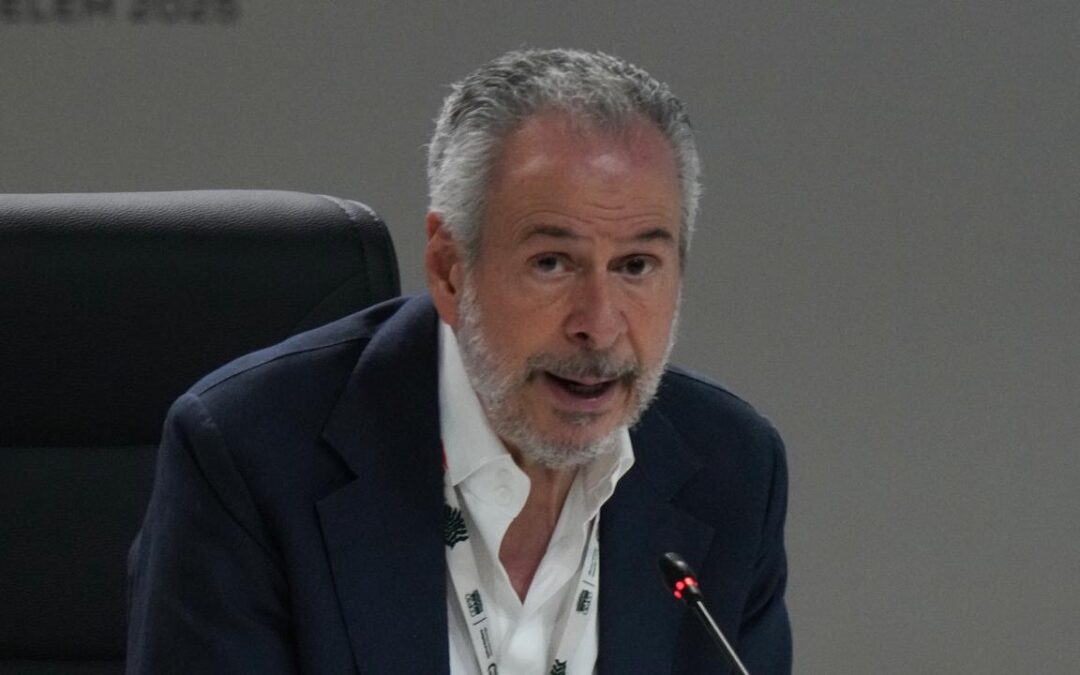
COP30 host urges unity ahead of fossil fuels showdown
The host of the COP30 climate summit in Brazil has urged countries to unite for a deal as a showdown loomed in the summit’s final hours over whether the accord should set the world on a clearer path away from fossil fuels.
“This cannot be an agenda that divides us,” COP30 president André Corrêa do Lago told delegates in a public plenary session at the conference before releasing them for further negotiations.
“We must reach an agreement between us.”
The rift over the future of oil, gas and coal underscored the difficulties of landing a consensus agreement at the annual conference, which serves as a perennial test of global resolve to avert the worst effects of global warming.
A draft text for a deal that was released by summit host Brazil before dawn contained no reference to fossil fuels, dropping entirely a range of options on the subject that had been included in an earlier version.
Scores of countries, including major oil and gas producer countries, had called the options unacceptable while 80 governments had come out in support of them.
Panama negotiator Juan Carlos Monterrey told a press conference before the plenary on Friday morning that leaving fossil fuels out of the COP30 deal risked turning the talks into a “clown show”.
“Failing to name the causes of the climate crisis is not compromise. It is denial,” he said.

The two-week conference in the Amazon city of Belem is scheduled to end on Friday evening.
Previous COP summits have blown past their deadlines before eventually reaching a compromise.
A deal text would need approval by consensus among the nearly 200 countries present in order to be adopted.
The United States has declined to send an official delegation this year under President Donald Trump, who has called global warming a hoax.
Corrêa do Lago said the exit of the world’s largest economy meant uniting around COP30 was crucial to ensure the multilateral process survives: “The world is watching.”
For days, countries have wrangled over the future of fossil fuels, whose burning emits greenhouse gases that scientists say are by far the largest contributors to climate change.
Dozens of members have been pushing hard for a “roadmap” laying out how countries should follow through with a promise made at COP28 two years ago to move away from oil, gas and coal.
The European Union’s commissioner for climate Wopke Hoekstra said in a statement delivered during consultations on Friday that the issue was important to building on past commitments to slash emissions.
“We need to make sure that the shift from fossil fuels to clean energy is real and in the text,” he said.
Saudi Arabia and other oil-producing countries are opposing this, negotiators at COP30 told Reuters.
A Brazilian negotiator told Reuters the fossil fuel language was unlikely to be reintroduced, and that the summit presidency was pressing for only small adjustments to the existing draft.
Other negotiators indicated that compromises to strengthen the deal’s commitments to step up emissions-cutting action were possible, particularly if wealthy countries could commit to provide more finance to help developing countries with a green transition.
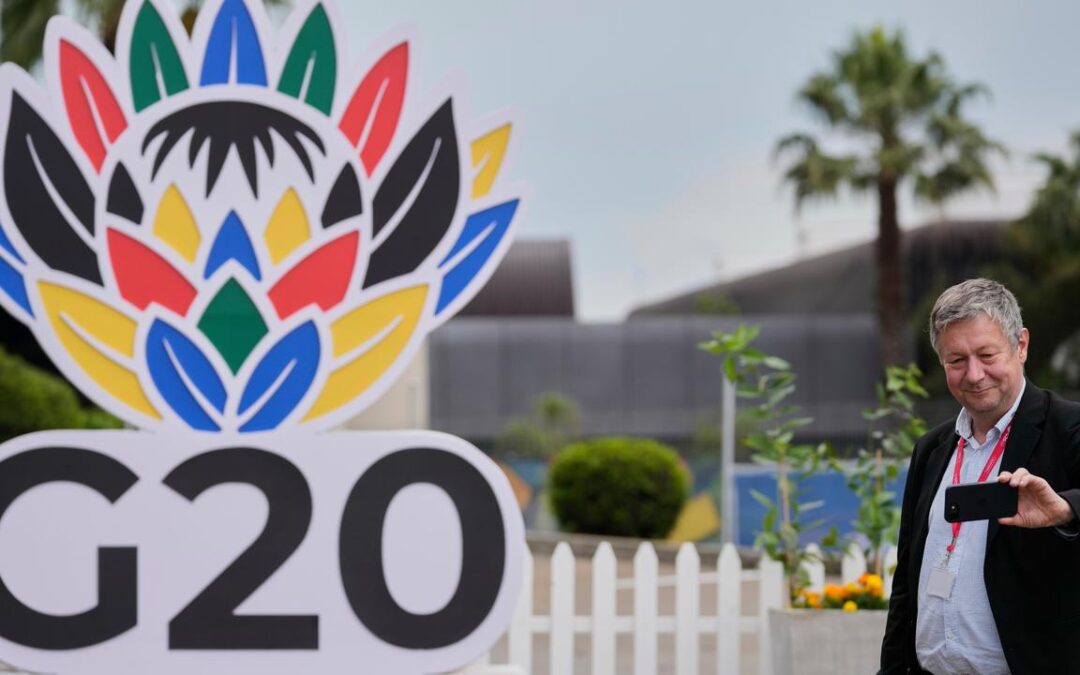
G20 envoys agree draft declaration, sources say
G20 envoys have agreed on a draft leaders’ declaration ahead of this weekend’s summit in Johannesburg without US input, four sources familiar with the matter say.
The administration of US President Donald Trump has indicated that it will boycott the November 22-23 summit over disagreements with host South Africa.
Trump had said he would not attend the G20 summit because of discrimination against the country’s white Afrikaner minority, an allegation the South African government rejects.
World leaders arrived on Friday for the first Group of 20 summit on the African continent that aimed to put the problems of poor countries at the top of the global agenda.
A leaders’ declaration is the usual climax of G20 summits and details any broad agreement reached by the members, although it is not a binding document.
The bloc has often struggled to put words into action due to the different priorities of members like the US, China, Russia, India and countries in western Europe.
“It is a longstanding G20 tradition to issue only consensus deliverables, and it is shameful that the South African government is now trying to depart from this standard practice despite our repeated objections,” a senior official in Trump’s administration said.
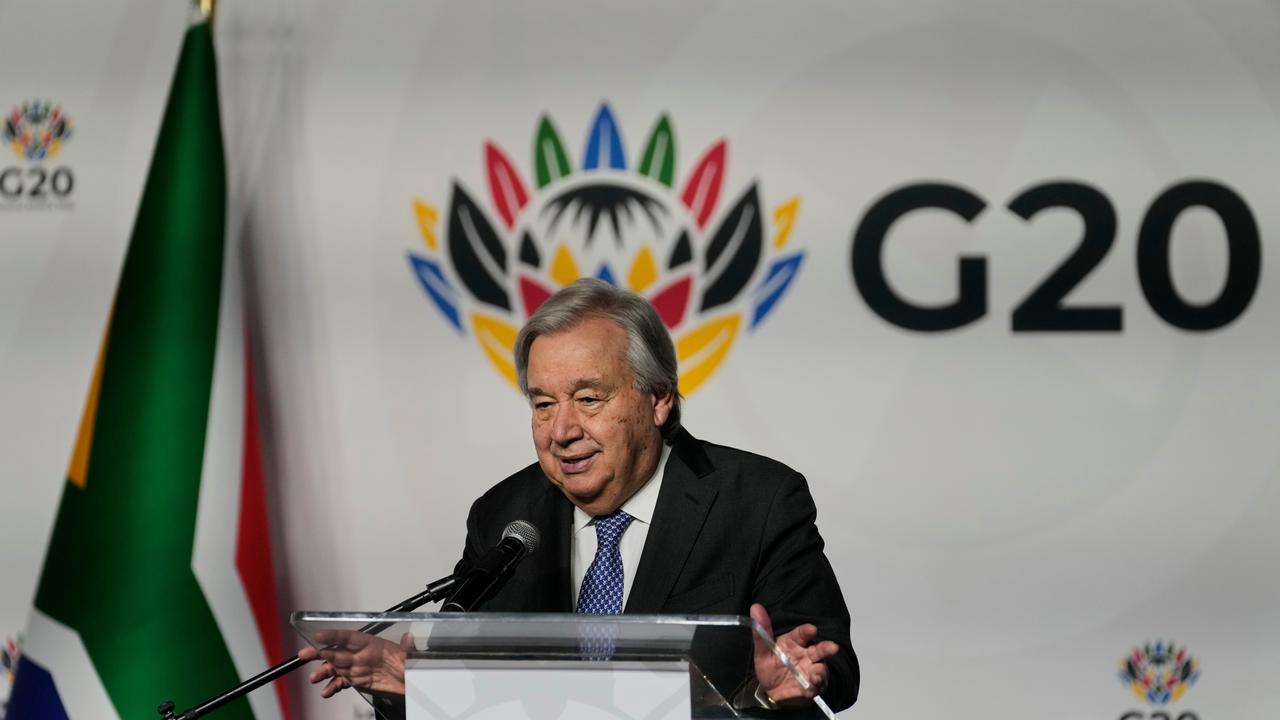
None of the sources divulged details of the declaration’s contents and it was not clear what concessions had to be made on the language to get everyone to agree, especially around climate change, any mention of which the United States had objected to being included in the discussion.
The G20 has expanded to 21 members, 19 countries plus the European Union and African Union, and is meant to bring rich and poor countries together to tackle problems, especially around the global economy.
Three out of four of South Africa’s planned top agenda items – preparing for climate-induced weather disasters, financing the transition to green energy and ensuring the rush for critical minerals benefits producers – were largely about climate change.
President Cyril Ramaphosa said on Thursday that South Africa was in discussions with the United States – which will host the G20 in 2026 – over its possible participation in the summit after all, although the White House later denied this.
Ramaphosa had earlier said he was resigned to handing over to an “empty chair”.
The White House on Thursday said it would send the US charge d’affaires for the G20 handover, an offer which South Africa’s presidency rejected.
Meanwhile, UN Secretary General António Guterres urged the G20 members to work towards ending conflict.
Before the start of the G20 on Saturday, Guterres called on its members to “use their influence and voices to end the conflicts that are causing so much death, destruction and destabilisation around the world”.
Guterres specifically mentioned the wars and conflicts in Ukraine, the Gaza Strip, Sudan, Mali and the Democratic Republic of Congo.
“Everywhere – from Haiti to Yemen to Myanmar and beyond – we must choose peace anchored in international law,” he said.
He also called for countries to take action on climate change and help reduce global inequalities: both financial inequality, and when it comes to representation in international institutions.
with AP
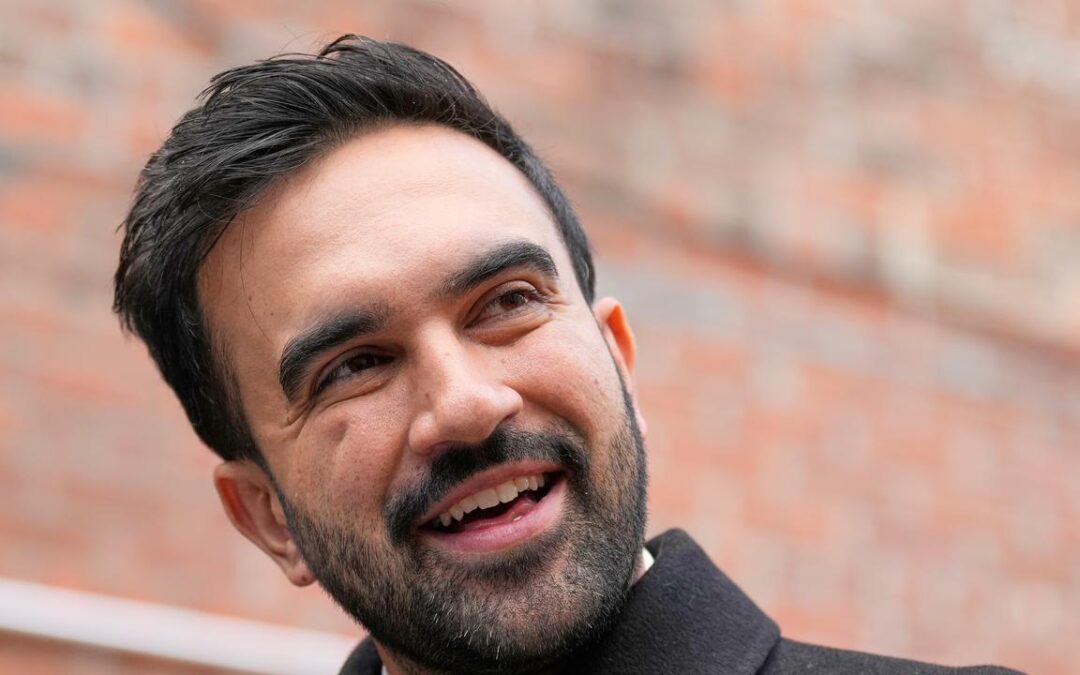
Trump expects ‘quite civil’ meeting with Mamdani
US President Donald Trump has called New York City’s mayor-elect Zohran Mamdani a “100 per cent communist lunatic” and a “total nut job” while Mamdani has called Trump’s administration “authoritarian” and described himself as “Donald Trump’s worst nightmare”.
So their first-ever meeting, scheduled for 3pm on Friday (7am AEDT on Saturday) at the White House, could be a curious and combustible affair.
Despite months of casting each other as prime adversaries, the Republican president and new Democratic star have also indicated an openness to finding areas of agreement that help the city they have both called home.
Trump, in a Fox News Radio interview on Friday morning, said he expected the meeting will be “quite civil”.
Mamdani, a democratic socialist who takes office in January, said he sought the meeting with Trump to talk about ways to make New York City more affordable.
Trump has said he may want to help him out.
But for both men, the meeting offers opportunities beyond any areas of potential bipartisan agreement.
The two men are convenient political foils for each other, and taking the other one on can galvanise their supporters.
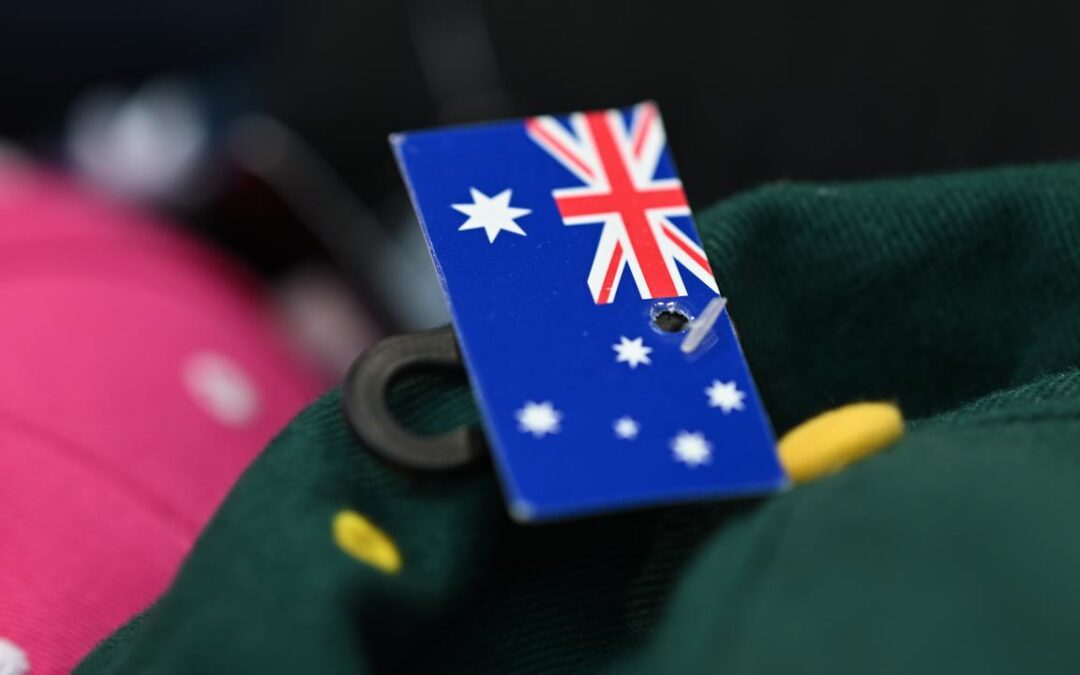
‘Important step’: hope for progress on stalled EU deal
A long-awaited free trade agreement between Australia and the EU had shown signs of serious progress, the trade minister says, as the European bloc indicates negotiations were gathering momentum.
Don Farrell has held talks with EU trade commissioner Maroš Šefčovič on advancing the elusive pact, after negotiations previously fell over twice at the final hurdle.
Despite previous sticking points over sheep and beef exports, Senator Farrell said the discussions in Australia on the agreement showed there was optimism on a deal being struck.
“This was the second time that (commissioner Šefčovič) had come to the region in a month, which I took as a very positive sign that that he is serious about progressing the (agreement),” he told reporters in Melbourne on Friday.
“Is his time frame too ambitious? Well, we’ll see.
“We’re committed to getting an agreement and working as fast as we can to get there. It’s going to be an important step forward.”
The progress on negotiations coincides with Prime Minister Anthony Albanese being set to meet with EU President Ursula von der Leyen on the sidelines of the G20 summit in Johannesburg.
Australia has long sought to secure better access to European markets for local beef producers, a demand on which EU negotiators have so far refused to budge.
A free trade deal would give Australian exporters greater access to global markets of more than 450 million people, Senator Farrell said.
“It’s the one agreement that has escaped us,” he said.
“We do believe in free and fair trade. We’re prepared to put our money where our mouth is and to develop more and more free trade agreements.”
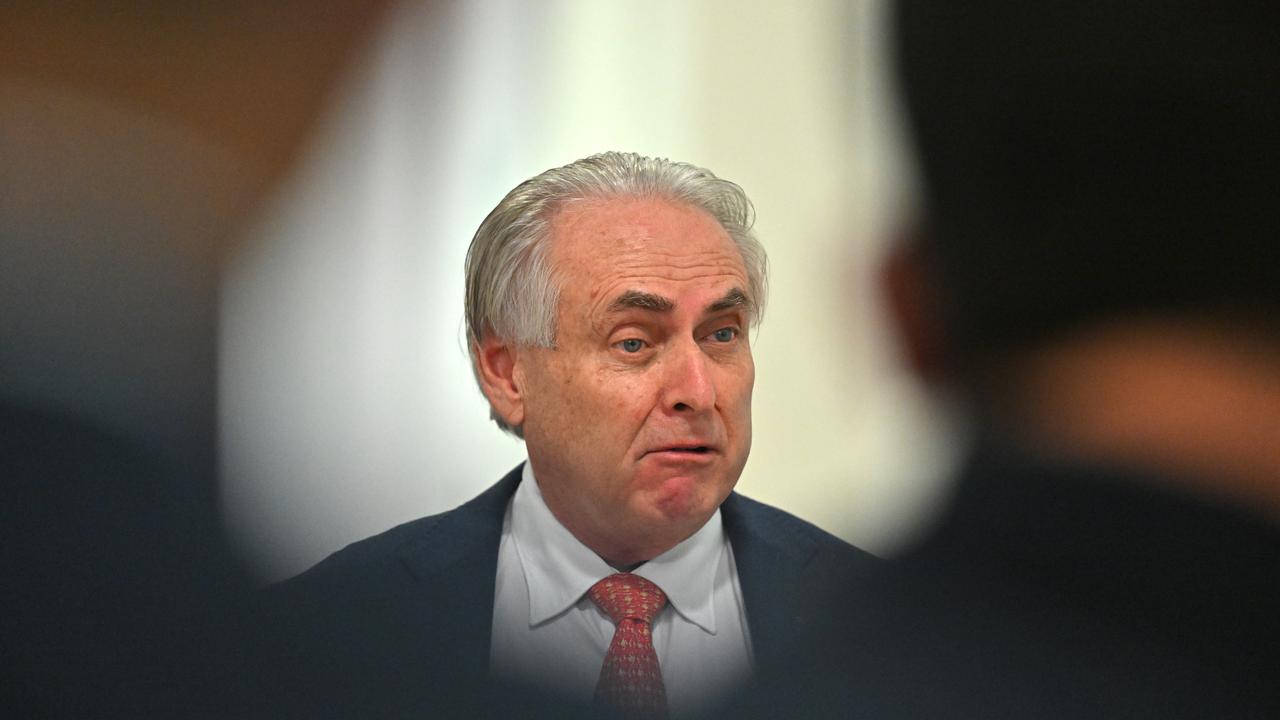
Mr Šefčovič told reporters on Friday negotiations for a free trade agreement were gaining momentum.
Despite years of difficult talks, Mr Šefčovič said discussions and exchanges were constructive, leaving him optimistic.
He believes the final stages of negotiations would occur by early next year.
“That is achievable,” Mr Šefčovič said.
“We know they are difficult, but I believe we learned from the past so we would keep an open mind on how to resolve them.
“I think that what clearly would be needed would be compromise from both sides.”

Neo-Nazi accused of threatening politician denied bail
A neo-Nazi accused of directing supporters to “rhetorically rape” a federal politician will remain behind bars, as federal police crackdown on threats and harassment against elected officials.
Joel Davis, 30, appeared before Sydney magistrate Daniel Covington on Friday, when he was denied bail.
The National Socialist Network mouthpiece allegedly used a carriage service to encourage abuse and hate towards independent Wentworth MP Allegra Spender.
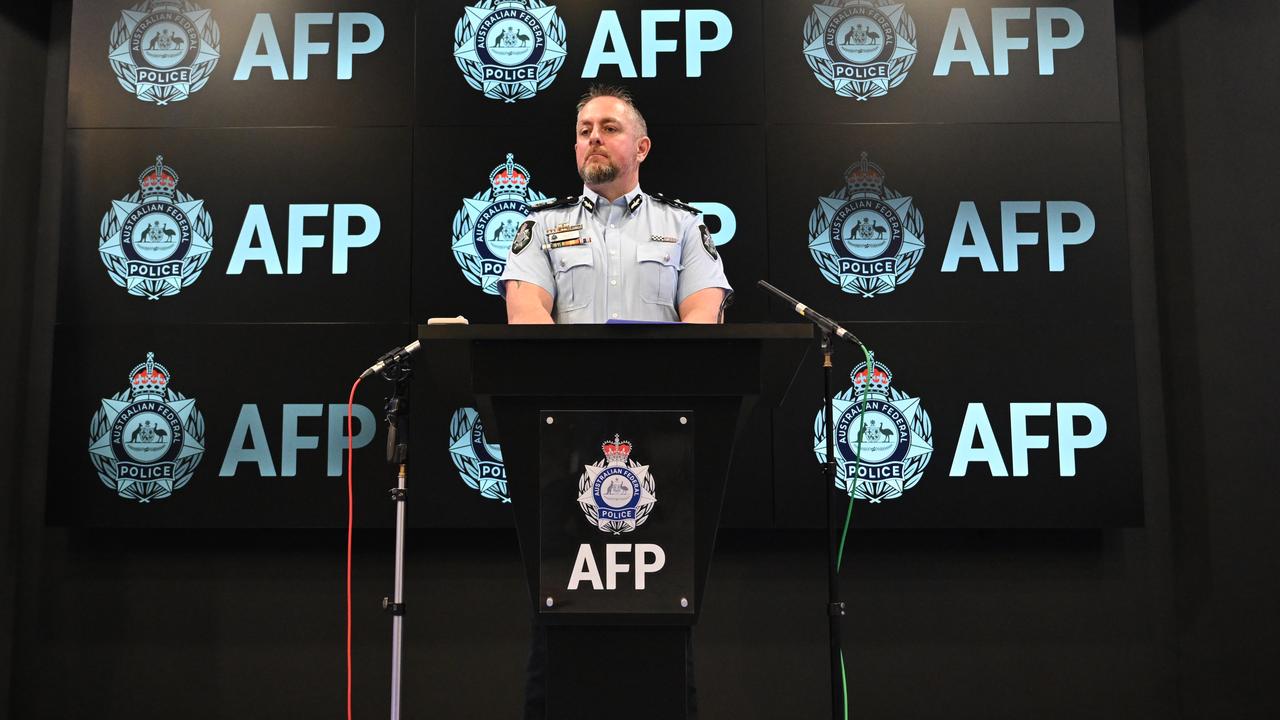
Davis is accused of calling on supporters to “rhetorically rape” the parliamentarian in an encrypted online platform after she condemned the group for holding a rally to “abolish the Jewish lobby” outside the NSW parliament earlier in November.
Representing Davis, Liam McKibbin told the online court hearing his client’s pregnant partner was due to imminently give birth to their son.
The pair have planned a home birth with a midwife at their Bondi residence.
Noting the “alleged disturbing conduct,” the defence lawyer said it doesn’t include a “specific physical threat of violence”.
Opposing bail, prosecutor Kristen Wakefield said Davis’ South Australian criminal history showed he is bailed to an address there.
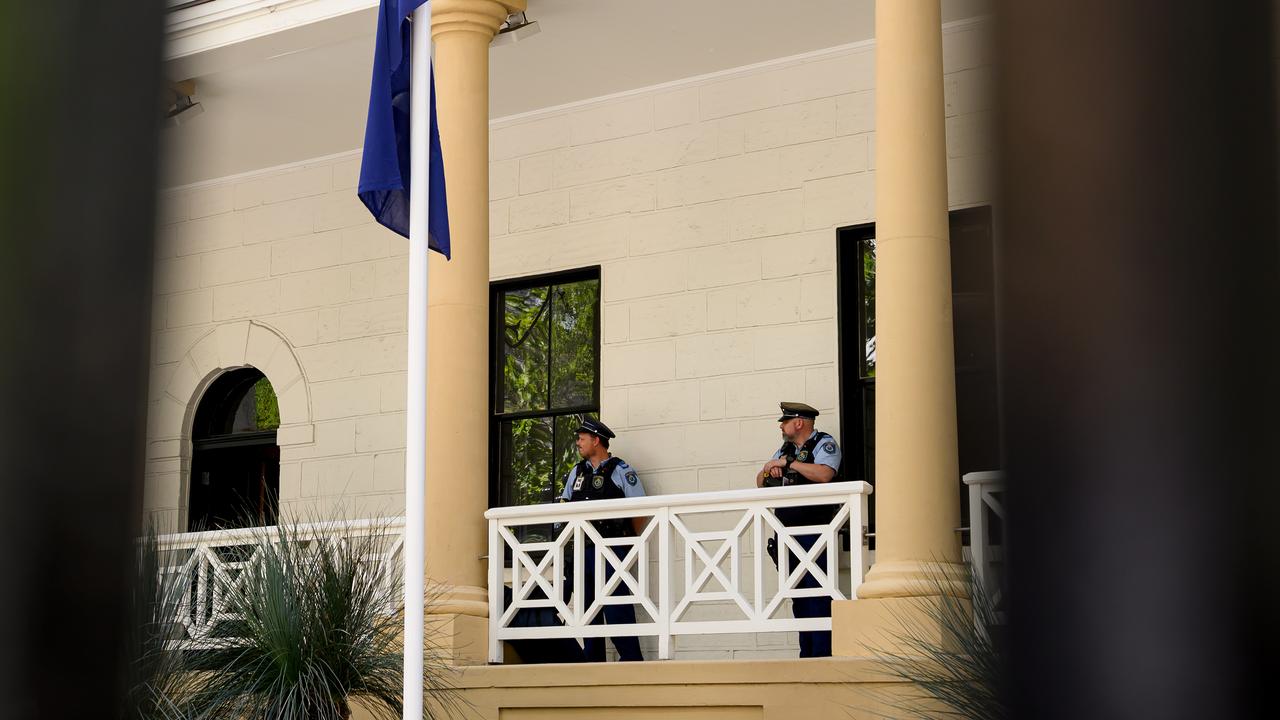
She said he was an unacceptable risk, noting failure to appear, danger posed to community safety, and the alleged offending occurring while on bail.
Ms Wakefield said due to Telegram’s wide audience, it would be very difficult for federal police to conduct compliance checks to ensure he wasn’t continuing to offend.
Refusing the bail application, Mr Covington said there was an unacceptable risk of Davis committing a serious offence and endangering community safety.
He will next appear before court online on December 3.
Australian Federal Police National Security Investigations teams have arrested three people, including Davis, in the past week for allegedly harassing or threatening parliamentarians.

They include a Tamworth man, 29, issued a court attendance notice for allegedly sending online threats to an Australian high office holder, in addition to a 32-year-old Victorian man for allegedly using a carriage service to harass a politician.
AFP acting Assistant Commissioner Matthew Gale said 951 referrals had been made in the 2024/2025 financial year over threats to federal politicians.
“The AFP is very concerned, and our national security investigations teams, alongside with our specialist protective command, are working hand in glove with our federal parliamentarians to make sure that we provide them with the assurances and the safety that are required,” he told reporters in Canberra.
“Threats against federal parliamentarians is a significant issue for us.”
He said there had been year-on-year increases in threats, with a 63 per cent rise over the last four years.
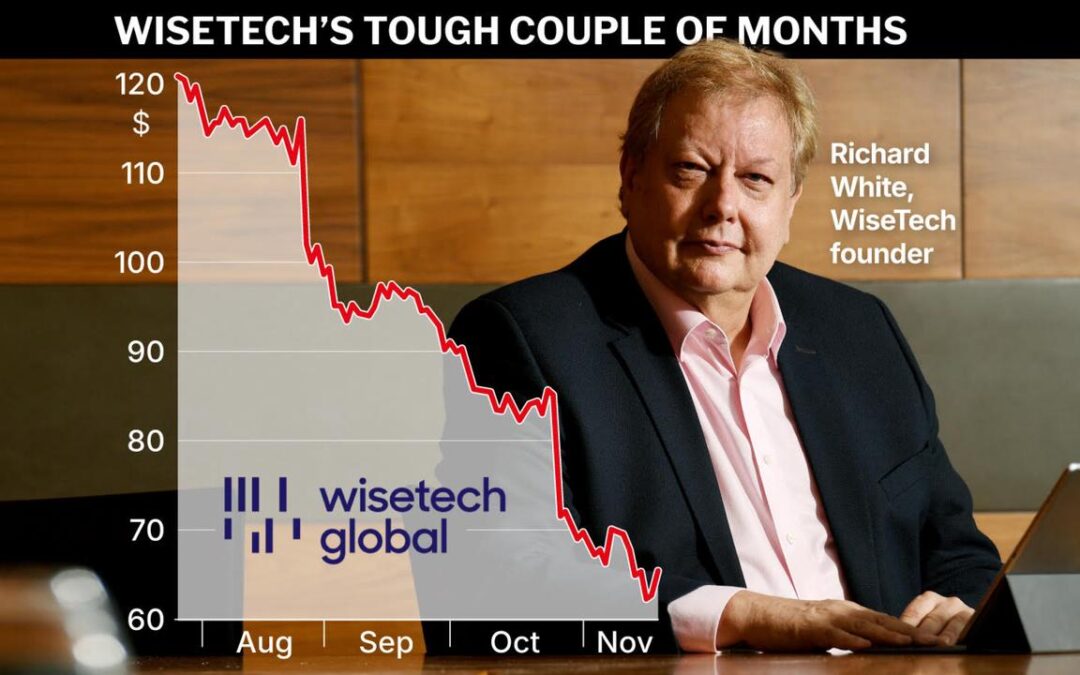
Passionate founder holds back tears before shareholders
The leaders of one of Australia’s biggest tech companies have assured shareholders it’s on the right track, despite the share price halving during a year marred by controversies.
WiseTech’s billionaire founder Richard White, currently under investigation along with three staff over allegations of improper trading in company shares, fought back tears in his annual address to shareholders.
“I want to thank the whole WiseTech team with their passion and brilliance, our customers and partners for their trust and collaboration, and of course, you, our shareholders or your ongoing belief in WiseTech,” Mr White said, stopping briefly as his eyes welled up.
“I’m sorry, I’m very passionate about this company.”

His speech on Friday came a day after the retirement of director Michael Gregg, who had announced his departure along with Charles Gibbon in June, the latest in a host exiting the company’s board in 2025.
“Charles and Mike have provided significant business acumen, thoughtful advice, always independent thinking and invaluable knowledge throughout WiseTech’s journey,” Mr White said.
“Their impact on this company runs really deep and their role in history will be remembered well into the future.
“And this year, with their efforts and the efforts of many others, the company has grown its revenue by more than 200 times and has become the leading global provider of international trade and logistics software.”
New lead independent director Andrew Harrison took the opportunity to assure shareholders the company was on the right track, and played down speculation about the probe by the Australian Federal Police and Australian Securities and Investments Commission.
“Let me be very clear, this matter is only in the investigation stage, and no charges have been brought against any individual, nor have any allegations been made against WiseTech Global,” Mr Harrison said.
“We know that speculation can have real impacts on our people, on confidence and on shareholder sentiment, but what I can assure you is that WiseTech was built over three decades on a solid foundation by a combination of organic and inorganic growth initiatives and a diverse and highly skilled team.”

WiseTech’s board review process, which has included work from independent auditors, would continue under the current board.
Mr Harrison was re-elected as a non-executive director, but noted he did not plan to serve a full three-year term after almost a decade with the company.
“Once the new board is fully in place and working well, I intend to step down with another non-executive director assuming the role of lead independent director,” he said.
WiseTech’s leadership succession plan included the appointment of Zubin Appoo in July, months after Mr White appointed himself executive chair of the company.
The move came after a rash of board resignations following complaints about the founder’s conduct, including allegations of bullying and undisclosed relationships.
An independent review later cleared Mr White of the misconduct allegations, which he had denied.
Investors responded positively to the presentation, with WiseTech see-sawing from a 2.8 per cent drop at the start of trading on Friday to a more than four per cent gain to $66.81 just over an hour into the annual meeting.
The company’s share price has more than halved since hitting an all-time high of $141.61 on the same date last year.

Treasurer blocks US takeover of Aussie pharma company
A big-money bid for an Australian medicine maker has been scuppered by Treasurer Jim Chalmers after the Foreign Investment Review Board found the deal was not in the national interest.
The sticking point for the $672 million acquisition of Mayne Pharma came after the bidder, US healthcare giant Cosette, threatened to sell or shut down the Australian company’s factory in Adelaide.
The treasurer said his decision to kill off the deal was “entirely consistent with the FIRB advice” that the proposal would be contrary to Australia’s national interest.
“Following broad consultation, I received unequivocal advice from Treasury and FIRB that no conditions could be put in place to adequately mitigate national interest risks, particularly unique risks to the supply of critical medicines,” Dr Chalmers said in a statement on Friday.
“This advice incorporated views from the Department of Health and Aged Care, the Therapeutic Goods Administration and the South Australian Government.”
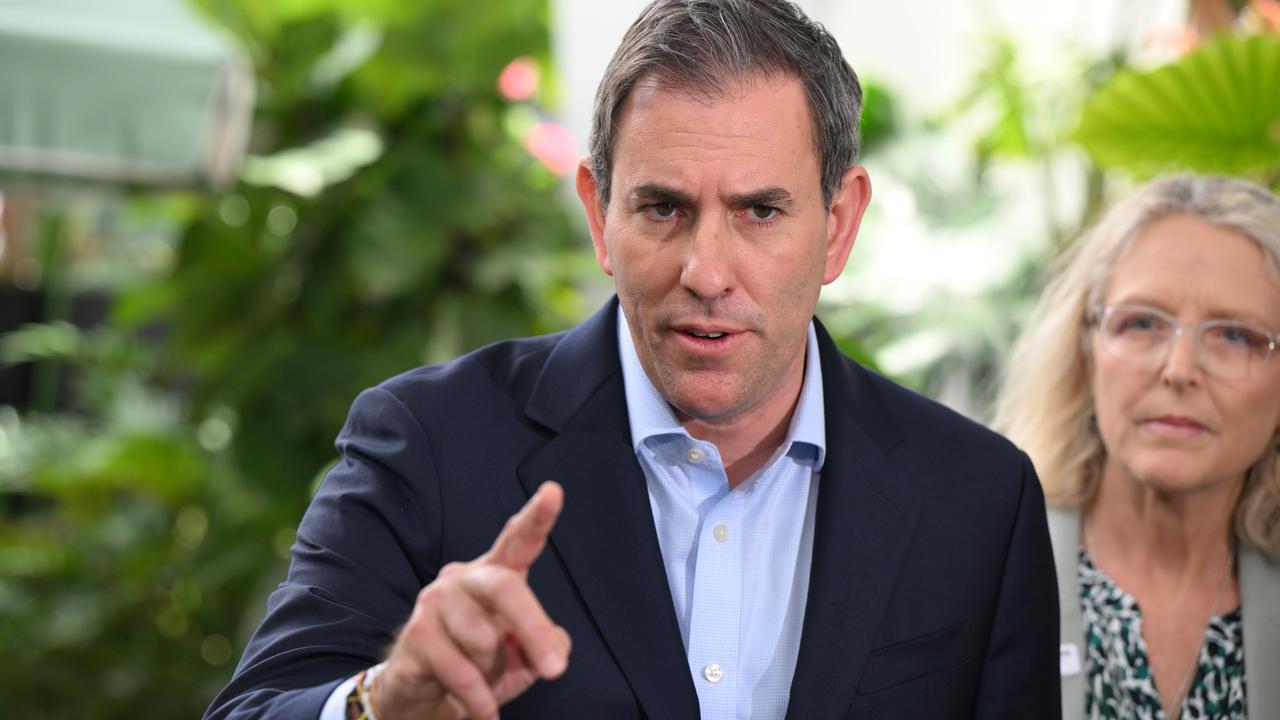
The decision will come as good news for Cosette, a New Jersey-based private equity firm that has been trying for months to exit the $7.40-a-share deal struck in February, after Mayne’s financial performance soured and its share price tumbled below $5.
After a Supreme Court bid to extricate itself failed, Cosette’s final gambit ultimately proved successful – to force the FIRB’s hand by threatening to shut down the profitable Salisbury plant and shed its 200-odd jobs.
Dr Chalmers in late October told Cosette his preliminary view was not to allow the deal, because of the risk to jobs and Australia’s sovereign research and development capabilities if it went ahead with closing the factory.
Mayne went into a trading halt shortly after the ASX opened on Friday morning.
Shares in the company fell more than 20 per cent to $4.60.
The FIRB was initially due to make its final ruling on Thursday, but Mayne released a statement to the share market that day notifying that the review board had extended the approval deadline until Friday.
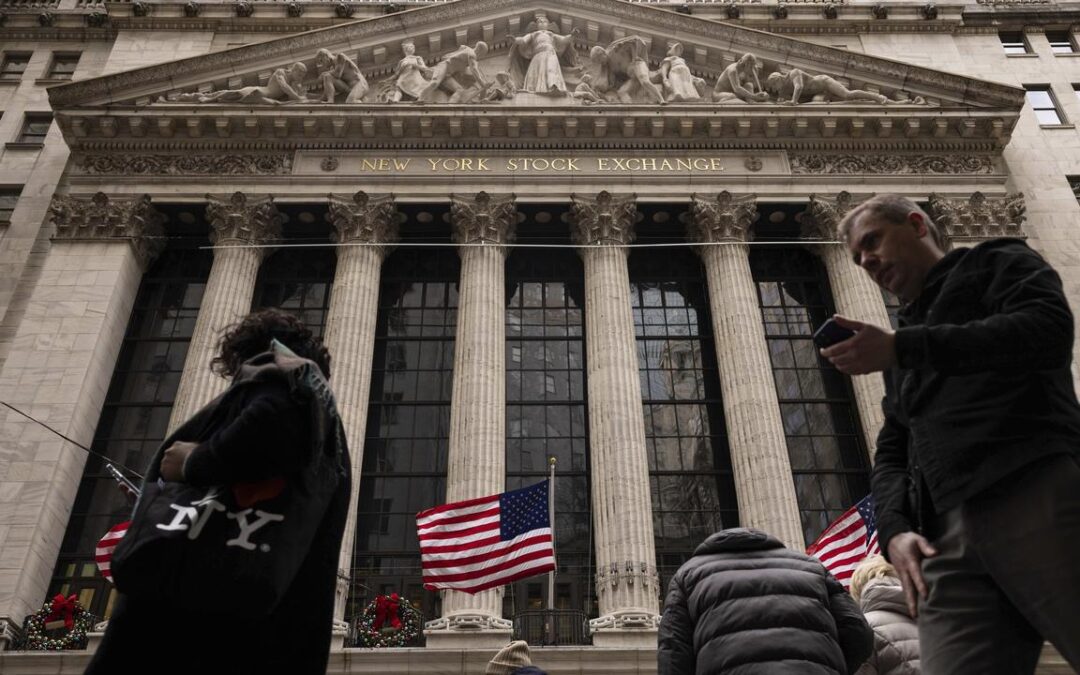
US posts solid jobs data in September, unemployment up
US employment growth accelerated in September, but the labour market remained sluggish and failed to keep pace with new job-seekers as employers dealt with fallout from import tariffs and integrated artificial intelligence into some positions.
The jobless rate rose to 4.4 per cent, its highest level in four years, from 4.3 per cent in August, the Labor Department said in its closely watched employment report on Thursday.
The August payrolls data was revised to show employers shedding jobs for the second time this year, underscoring the labour market softness.
Other data from the Labor Department showed layoffs stayed low in mid-November, suggesting the job market remained stuck in what economists and policymakers call a “no-hire, no-fire” state.
Some economists viewed the rise in the jobless rate as bolstering the argument for another Federal Reserve interest rate cut next month, while others said the better-than-expected job growth suggested the US central bank should stay pat, especially since policymakers would not get another employment report before the December 9-10 meeting.
“The upside surprise in this report is positive, but it likely dampens prospects for a rate cut in December,” said Olu Sonola, head of US economic research at Fitch Ratings.
“The slight uptick in the unemployment rate complicates the narrative – pick your poison, stronger job growth or rising unemployment, because the good news may not be as good after all.”
Non-farm payrolls increased by 119,000 jobs after a downwardly revised drop of 4000 in August, the Labor Department’s Bureau of Labor Statistics said.
Economists polled by Reuters had forecast 50,000 jobs would be added after a previously reported gain of 22,000 in August. The survey of establishments also showed job growth in July was downgraded by 7,000 to 72,000 positions.
The report was initially due on October 3, but was delayed by the shutdown of the federal government. The 43-day shutdown, the longest in US history, forced the BLS to cancel the release of October’s report as no data was collected for the household survey to calculate the unemployment rate for that month.
Job gains in September were partially flattered by difficulties adjusting for workers leaving their summer jobs, resulting in higher payroll counts in the leisure and hospitality industry as well as retail industry.
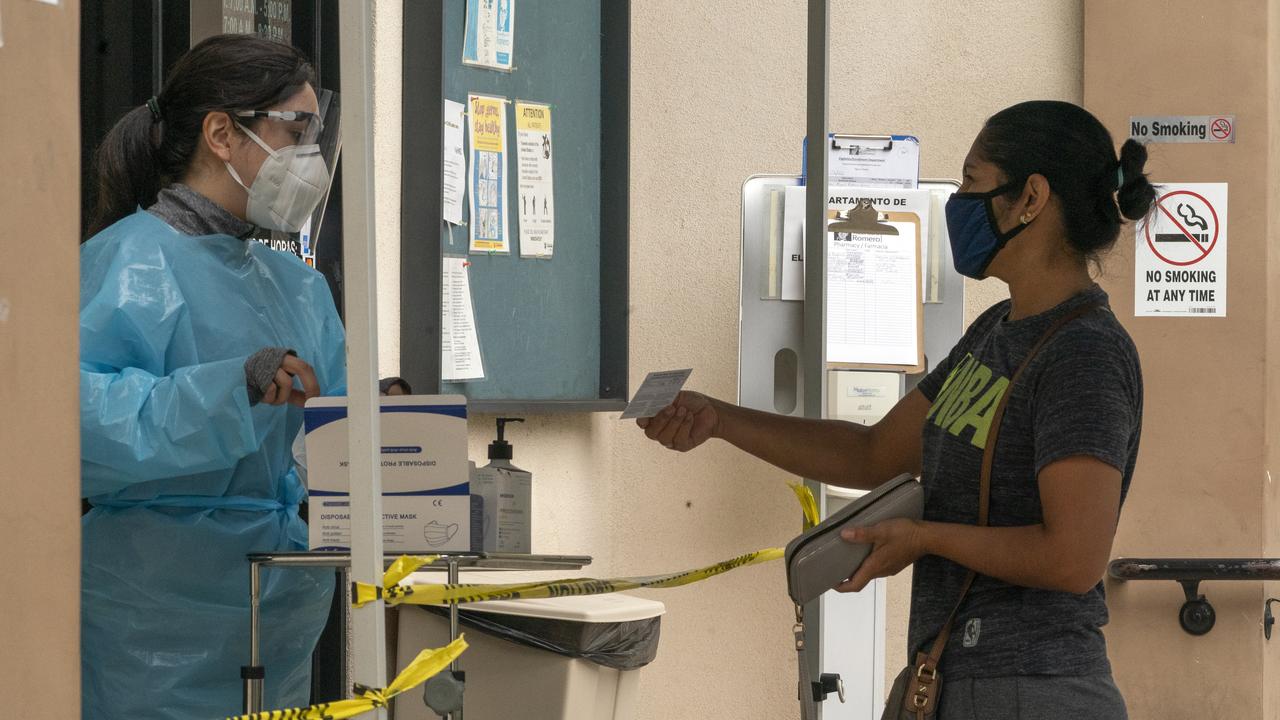
The healthcare sector continued to lead employment growth, adding 43,000 jobs in September, mostly in ambulatory services and at hospitals. Employment at restaurants and bars increased by 37,000 jobs, with overall leisure and hospitality payrolls rising by 47,000.
Retailers added 13,900 positions. But the transportation and warehousing industry lost more than 25,000 jobs, while manufacturing shed a further 6,000 positions. Professional and business services payrolls decreased, with temporary help services accounting for the bulk of the drop.
Federal government employment dropped by another 3000 jobs, bringing the total losses since January to 97,000. That number is expected to surge as tens of thousands of workers who took buyouts dropped off government payrolls at the end of September.
The labour market has lost significant momentum this year, as evidenced by sharp downward revisions to non-farm payroll counts. Economists and policymakers blame the slowdown on reduced supply and demand for workers.
Economists estimate the economy needs to create less than 100,000 jobs per month to keep up with growth in the working-age population, though the rise in the unemployment rate in August and September suggests the break-even rate could be higher.
“The unemployment rate has trended higher, but for the ‘right’ reasons because labour force participation is rising even faster than the solid gains in employment,” said Stephen Stanley, chief US economist at Santander US Capital Markets.
“This is very far from the results one would expect if the labour market were spiralling downward.”
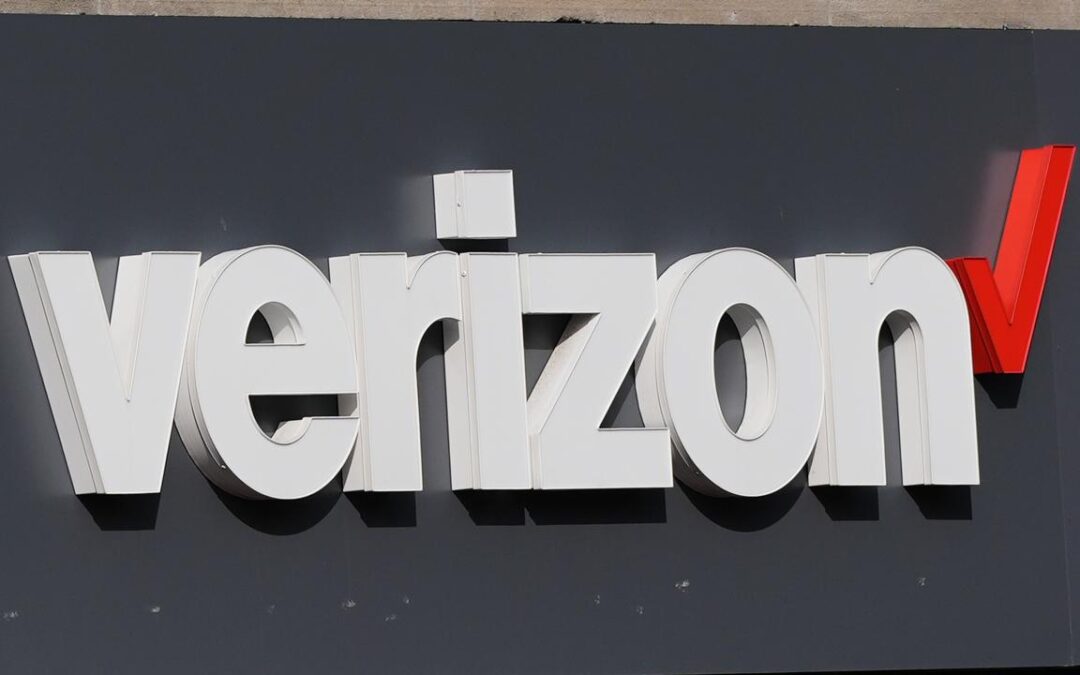
Verizon cutting 13,000 jobs to ‘reorient’ company
Verizon is laying off more than 13,000 employees in mass job reductions that arrive as the US telecommunications giant says it must “reorient” its entire company.
The jobs cuts began on Thursday, according to a staff memo from Verizon CEO Dan Schulman.
In the letter, which was seen by the Associated Press, Schulman said Verizon’s current cost structure “limits” the company’s ability to invest -pointing particularly to customer experiences.
“We must reorient our entire company around delivering for and delighting our customers,” Schulman wrote.
He added that the company needed to simplify its operations “to address the complexity and friction that slow us down and frustrate our customers”.
Verizon had nearly 100,000 full-time employees as of the end of last year, according to securities filings.
A spokesperson confirmed that the lay-offs announced on Thursday account for about 20 per cent of the company’s management workforce, which is not unionised.
Verizon has faced rising competition in both the wireless phone and home internet space – particularly from AT&T, T-Mobile and other big market players.
New leadership at the company has stressed the need to right the company’s direction.
Schulman took the CEO seat just last month.
In the company’s most recent earnings, he stated that Verizon’s trajectory was at a “critical inflection point” – and said, rather than incremental changes, Verizon would “aggressively transform” its operations.
For its third quarter of 2025, Verizon posted earnings of $US4.95 billion ($A7.62 billion) and $US33.82 billion in revenue.
The carrier reported continued subscriber growth for its prepaid wireless services but it lost a net 7000 postpaid connections.